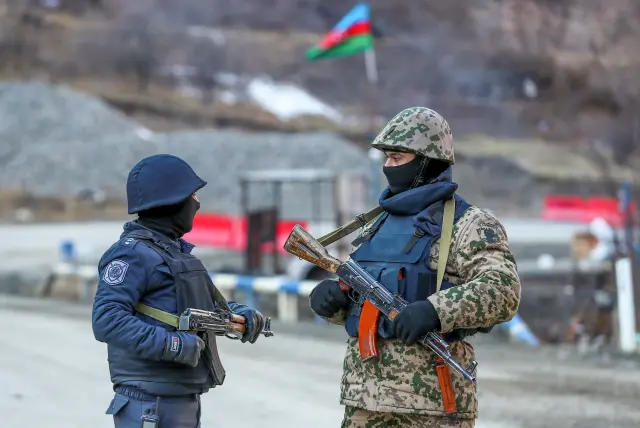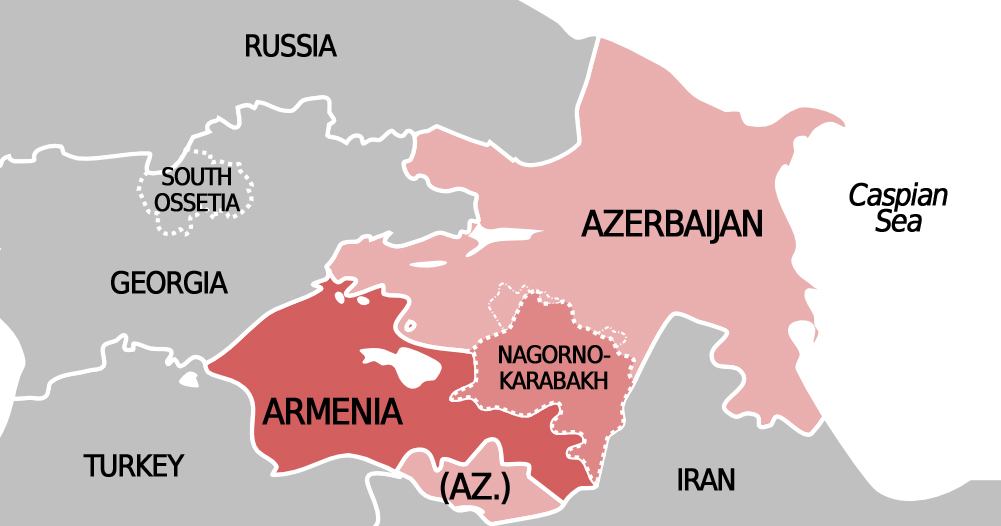
- The most important concern in Yerevan was not Karabakh’s condition, but what it called “security and rights guarantees” for those living there.
- The Armenians’ ability to accept this new reality will determine how these questions are answered in large part.
- The Azerbaijani government will probably approach the native inhabitants of the area and Armenian immigrants differently.
- Moscow’s influence will be comparable to that of Ankara, Brussels, and Washington in all other respects.
In the long-running conflict between Armenia and Azerbaijan, a turning point has been reached. Last week, Armenia’s Prime Minister Nikol Pashinyan told the nation that only peace would be possible if its territorial ambitions were narrowed to those of the Soviet Socialist Republic. In other words, it must renounce its claim to Nagorno Karabakh, over which it has fought numerous wars with Azerbaijan.
A few days later, on April 23, Azerbaijan established a checkpoint in the Lachin Corridor, also known as the “road of life,” which connects Armenia with the unrecognized Nagorno-Karabakh Republic. Yerevan appears ready to assume full control of Karabakh. Even though Pashinyan’s announcement essentially contained nothing new, it was widely reported and stunned many with its frankness. Since losing the 2020 war, the Armenian government has worked to come up with a plan for Karabakh’s future that would please Baku while avoiding widespread unhappiness in Armenia.
Pashinyan mentioned a shift in priorities as early as April of last year. The most important concern in Yerevan was not Karabakh’s condition, but what it called “security and rights guarantees” for those living there. This means that the Karabakh region would be an integral part of Azerbaijan, but difficult negotiations will have to take place on specific aspects such as the future of Armenia’s language. The prime minister further attempted to deflect blame by claiming that Yerevan had made its decision in response to requests from “near and far” international allies.
Although many Armenians would consider Pashinyan to be a traitor, he stated that he was prepared to sign a peace agreement with Baku in September.
In response to these declarations, Baku has been gradually enlarging the territory it controls in Karabakh. International allies of Yerevan chose not to intervene, and the Armenian government decided not to respond because doing so would have unavoidably infuriated both Baku and the international mediators. Azerbaijan didn’t even experience any effects when it blockaded the Lachin Corridor in December 2022, which connected Armenia and Karabakh (Baku insisted there was no blockade on its part). Armenia’s only option in response was to take a different route that had become available in the spring: a dirt road that even off-road vehicles had difficulty negotiating. However, as soon as Azerbaijanis started shooting at Armenian police on this route and later set up a checkpoint, even that became off-limits.
The unrecognized capital of the Nagorno-Karabakh Republic, Stepanakert, was not far away when Azerbaijan quickly set up a checkpoint on the main road leading there. The date was April 23. Russian peacekeepers stayed out of the conflict even though the Lachin Corridor was supposed to be under Russian control according to the tripartite agreements of 2020. The checkpoint presents the Armenians with a variety of brand-new, challenging issues. What documents will the border guards from Azerbaijan demand? Can Armenians be detained for merely having a suspicious appearance? Will they insist that there are no justifications for returning to Karabakh while only allowing entry into Armenia?
The Armenians’ ability to accept this new reality will determine how these questions are answered in large part. It appears that they have already at this time. Yerevan has come to the conclusion that, in the end, neither large-scale demonstrations nor international allies who do nothing more than “express concern” will have an impact on what happens to Karabakh.

What then lies in store for Karabakh? There is no reason to anticipate either the partisan war that Baku might fear or the ethnic cleansing that has been mentioned in Yerevan. According to the Azerbaijani authorities’ statements, they intend to treat the Karabakh Armenians similarly to how they treat other national minorities like the Lezgins, Talysh, and Tats. There won’t be any unique autonomous regions or adaptation initiatives. However, obtaining an Azerbaijani passport won’t be simple for the remaining Armenians in Karabakh. They might ultimately choose to relocate to Armenia once they are faced with the harsh new reality.
This raises another issue: whether ethnic Armenians in Karabakh will be able to sell their property or whether it will be taken over. The Azerbaijani government will probably approach the native inhabitants of the area and Armenian immigrants differently. The mass emigration of Armenians from Karabakh appears to be the most likely scenario in light of the current situation. Only the elderly who have a strong bond with their homes will stay. They don’t participate in politics or cause issues for the government.
The Armenian government now understands that the two-year EU observation mission they invited won’t save them by some miracle. The European observers were not present when the shooting started. Simply stated in their report, “In the absence of a demarcated border, the border of 1991 should be observed and the forces of both parties should withdraw to a safe distance from that line.” Yerevan was so dissatisfied that Pashinyan once more expressed his willingness to send a rival mission from the Collective Security Treaty Organization, which is led by Russia, to the border.
In Yerevan, there is concern that border tensions may persist even after the Karabakh conflict is over. For instance, the 2020 tripartite agreement stipulates that the Azerbaijani exclave of Nakhichevan should be connected to the rest of the country by road. Its status disputes pose a threat of further escalation.
The grieving process for the Armenians has already included the stages of denial and anger, and they are currently engaged in bargaining. Depression will need to pass before they can move on to the final stage of acceptance; however, Yerevan’s talk of peaceful development, such as opening a land border with Turkey and reviving economic ties with it, will help to lessen this depression.
While this is happening, it will be necessary to overhaul relations with Russia because the main topic of discussion—Karabakh—will no longer exist. The majority of Armenians will view the Kremlin as an unreliable ally who deserted them in their hour of need. Only a small number of opposition leaders from the previous elites would insist that Pashinyan is solely to blame and that things would have turned out differently if he had simply recognized Crimea as Russian territory. Moscow’s influence will be comparable to that of Ankara, Brussels, and Washington in all other respects.
(The author is a Post Graduate student in International Relations at Amity University, Raipur. She writes articles and research papers regularly on international affairs and geopolitics)
